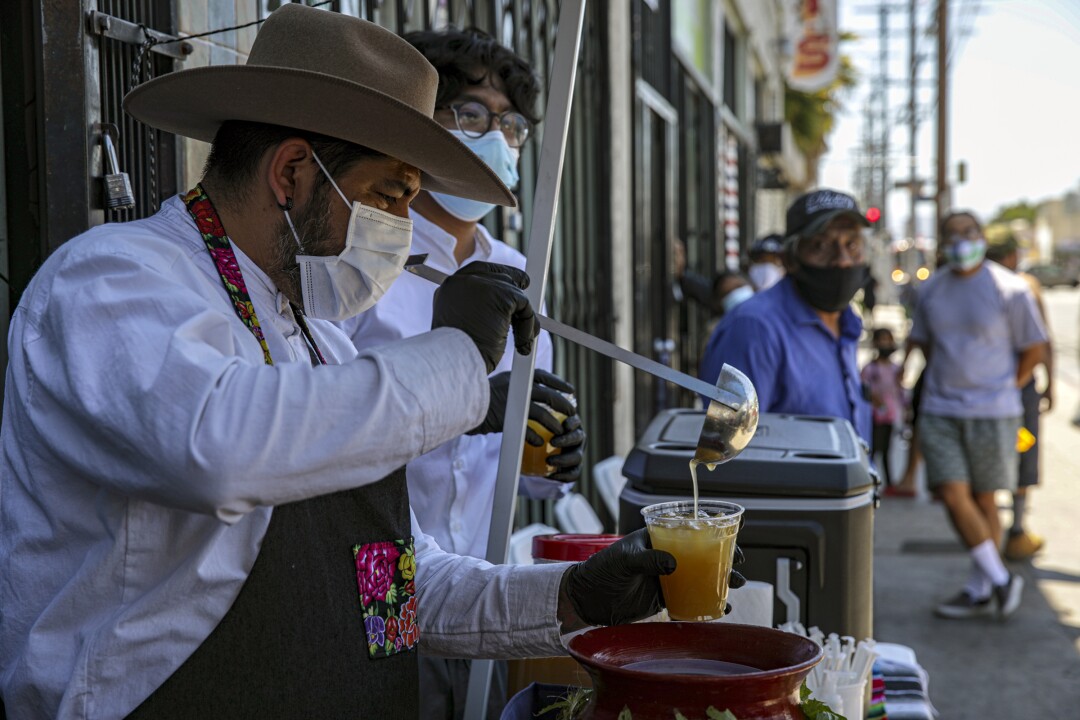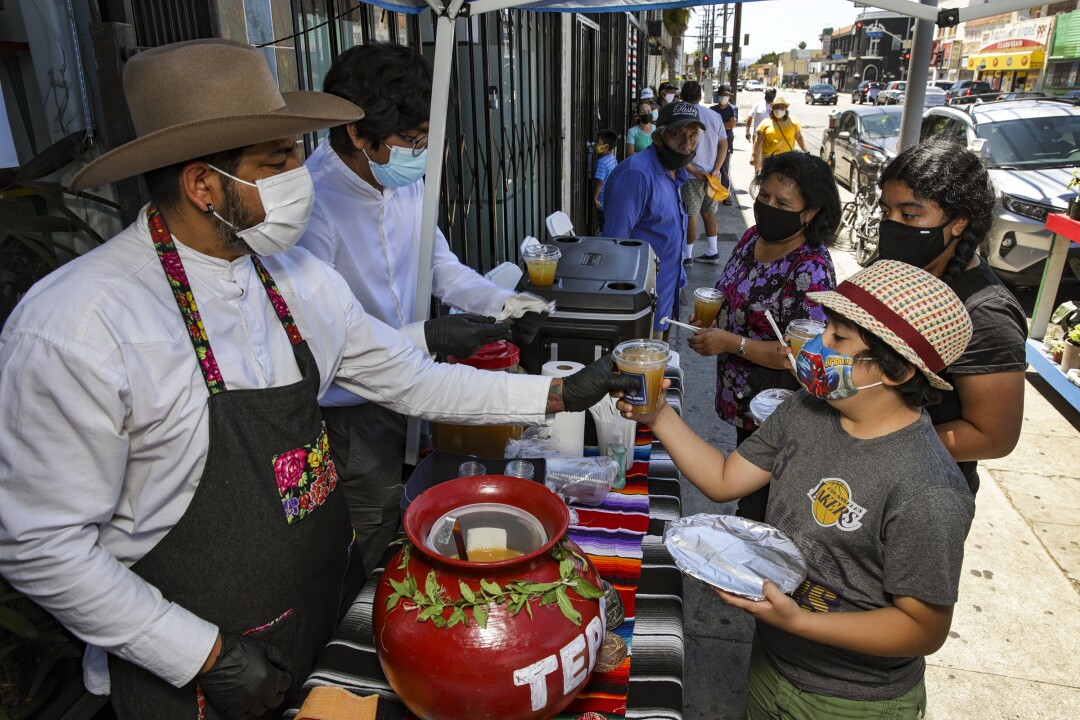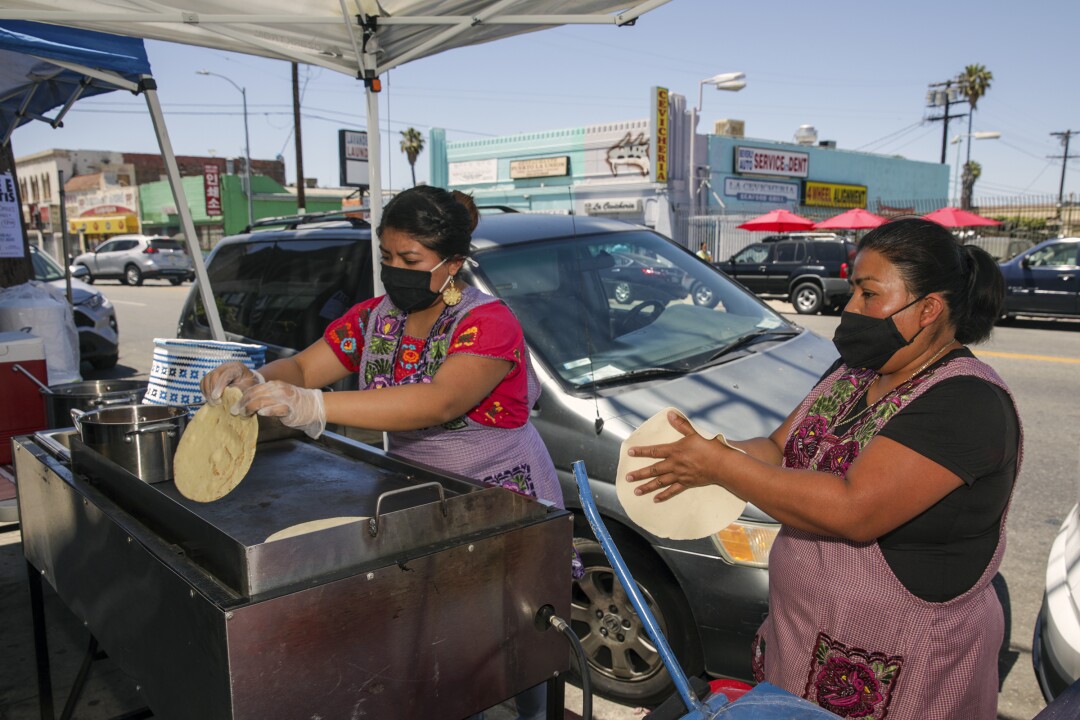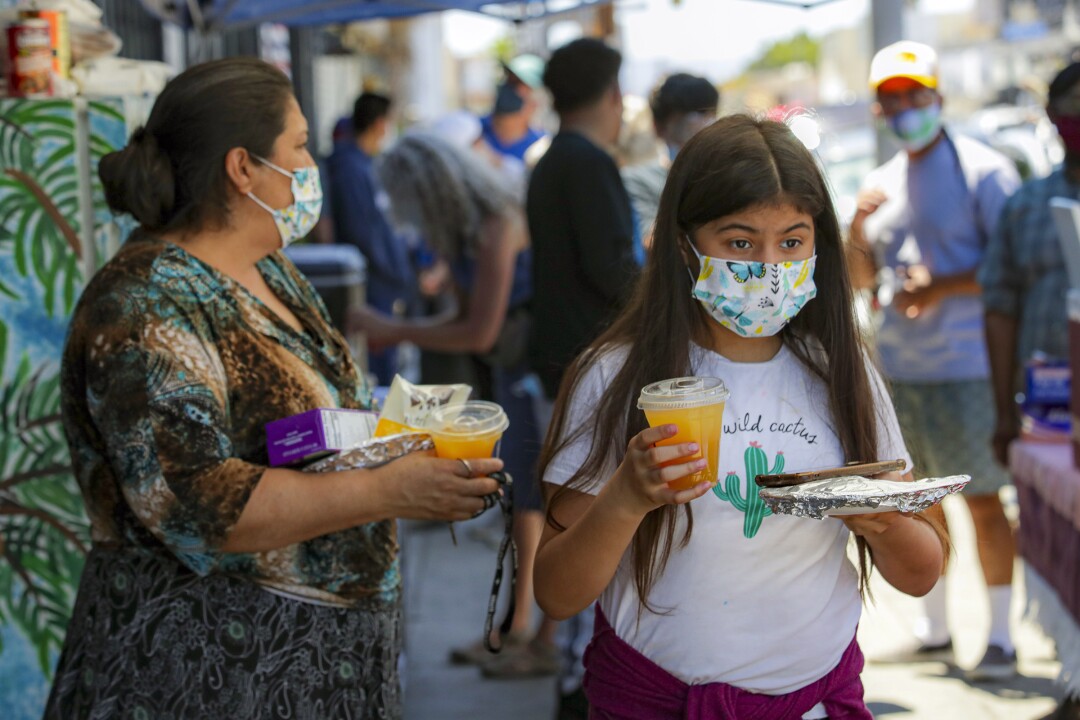Very last Saturday at the height of a scorching afternoon, Adela Ruiz and her partner, Paco, hopped out of their van and hurriedly established up a taco stand on Pico Boulevard in Arlington Heights. They were late.
He and a couple of good friends raised a pop-up tent and unfolded a desk on the sidewalk. She and her two daughters lugged out pots and trays stuffed with refried beans, rice, chiles rellenos and masa they had well prepared again at their house in Backyard Grove. Paco linked a flattop grill tank to a propane tank Adela put on a attractive pink-purple apron replete with embroidered roses and birds.
The couple, Zapotecs from the Mexican point out of Oaxaca, were prepared. Paco whipped out his smartphone, logged on to Instagram Dwell, and commenced to spiel.
“Pass by — free of charge foodstuff!” he cheerily introduced in Spanish. “We’ll hold out for you below!” He zoomed in on Adela, who labored a tortilla push like a boss, as the youngest daughter also filmed on her smartphone. The earthy scent of slowly but surely cooking masa stuffed the air. “Come right here,” Paco additional, “so these 100 chile rellenos can be finished!”
It was the third time in as quite a few months that the Ruiz household had pushed up from Orange County to hand out cost-free, home-cooked foods from this extend of Pico. They did so as part of Mid-Metropolis Cookouts, a biweekly party that has Oaxacan road vendors give out no cost foodstuff to both equally endorse their firms and feed any one who needs a warm meal.
But don’t phone Mid-Town Cookouts a charity — simply because organizers and participants really do not see it that way at all.
What they’re undertaking is the art of guelaguetza, a Zapotec word and notion most famed in Los Angeles as the name of a famous Oaxacan restaurant. It actually refers to mutual help, the notion that offering is as vital as acquiring — and that communities want to do equally often to prosper.
“It’s a thing that we follow as Indigenous men and women, but now it’s about creating it in the colonia [neighborhood] exactly where we settled,” reported Manny Mireles, whose relatives hosts Mid-Town Cookouts in front of their flower and outfits boutique, Yeaj Yalhalhj. “We’d be carrying out it back residence, so it is critical for us to now exhibit the city that this is a network that has usually existed.”

Alex Lopez, 39, remaining, and his 17-year-old son distribute tepache for totally free.
(Irfan Khan/Los Angeles Occasions)
In L.A., Mid-City Cookouts’ edition of guelaguetza raises money on the web to spend suppliers. All those suppliers, in change, use that funds to import items from Oaxaca to not only make their traditional foods taste far better, but to enable nearby economies in their homeland. And eaters here find out about regional suppliers that they can patronize or use for catering at a future day.
“We’re demonstrating off our tradition and gastronomy by assisting persons who want enable now — and they get to study about who we are,” claimed the 43-yr-old Paco, as he finished off a different video clip. “We’re carrying out this with really like and ganas.”
If there was ever a yr for guelaguetza in Los Angeles, it is been this previous one, in particular for the city’s Zapotecs. They’re probably the largest Indigenous team from Latin The united states in Southern California, with an believed inhabitants of over 180,000. Commonly discriminated towards in Mexico and in the United States by their fellow Mexicans for their Indigenous heritage, area zapotecos banded jointly in 2020 to confront the coronavirus pandemic and the economic devastation it left in their group.
Activists collaborated with other Mexican and Central American Indigenous groups in the Southland on social media campaigns in their indigenous languages to battle vaccine hesitancy. Nonprofits held food stuff drives and handed out revenue to any one who necessary it.
But a significant point was missing from their attempts: festivals. Basketball tournaments and church festivals in honor of hometown patron saints had been canceled. The area rendition of Oaxaca’s once-a-year point out fair — also referred to as Guelaguetza — is not scheduled all over again until 2022. Imports from the point out, the lifeline of Oaxacan dining establishments in Southern California, slowed to a trickle.

Alex Lopez, 39, remaining, and his 17-calendar year-old son distribute tepache for free as component of Mid-Town Cookouts.
(Irfan Khan/Los Angeles Occasions)
“We Oaxacans know how to celebrate,” stated 56-yr-previous Vicente Ruiz, who owns a bicycle-mend store. “Not remaining in a position to have fiestas was tricky. That is why [Mid-City Cookouts] is significant.”
“It was about bringing pleasure to us,” stated Mireles. He and other people acquired the inspiration for Mid-City Cookouts from a equivalent work in East Hollywood. But they wished to concentrate on fellow zapotecos, in a city that too typically overlooks them. “We want to be seen as Indigenous persons. We want to see ourselves.”
There have been 12 Mid-City Cookouts so significantly, and sellers get paid out all over $700 per session. What utilised to be weekly events are now biweekly, simply because money are commencing to dry up for motives Mireles can not really gauge. But the spirit of this mini-guelaguetza conveniently spreads to those who take part.
The Ruiz family members have run their catering procedure for 3 decades. The pandemic slowed orders, so they would’ve never assumed of providing absent their grub for free of charge. But Mid-Metropolis Cookouts “opened our eyes,” Paco explained, “to be ready to assist other folks and ourselves.”

Mayra Ruiz, left, and her mom Adela Ruiz make clean tortillas for tacos in entrance of Yeaj Yalhalhj in Arlington Heights.
(Irfan Khan/Los Angeles Occasions)
A couple of blocks absent, Melina Cruz Bautista and her sister arrange grocery giveaways from their mother’s dry cleaner. She was in Yeaj Yalhalhj’s smaller gallery to established up for a reception afterwards that afternoon for her images of Los Angeles and Oaxaca.
“What I do is in gratitude of the group that has observed me increase up,” reported the 23-12 months aged, who also information a podcast with her sister about their activism. “L.A. is switching, so our technology of Oaxacalifornia [a portmanteau of Oaxaca and California] wants to make it so that individuals hear to us rather of conversing for us.”
Outside, Joe Nankin stocked a local community fridge with luggage of Brussels sprouts, bread and Samoas Female Scout cookies. He had at first arrive to Mid-Town Cookouts as an eater but immediately grew to become a volunteer.
“You hear about handing out absolutely free food items but not so considerably about mutual support,” claimed the 31-yr-previous. “The particular person who you feed can assist you, as well. It is not just about feeding persons but acquiring economically associated.”

People today choose totally free food outside the house Yeaj Yalhalhj as part of Mid-Metropolis Cookouts, a foods giveaway arranged by Zapotecs every single other week.
(Irfan Khan/Los Angeles Times)
Just across the way from the Ruiz taco stand, Alex Lopez blended a huge clay jug crammed with tepache, a fermented pineapple drink. He had misplaced his task as a cafe worker very last calendar year, so he started to provide tepache door to doorway to make ends fulfill. When he heard about Mid-City Cookouts, the 39-year-old experimented with to approach the organizers for a gig only to have Mireles invite him to start with.
Today, Lopez was handing out his tepache for absolutely free, declining any payment from Mireles for his services.
“Oaxacan or not, we want to aid everyone,” he said. “Like they say, ‘Organize, and assist.’”
By then, a hungry, thirsty line of Oaxacans and other Mexicans, Koreans and whites was ready for their cost-free food and consume. Mireles handed out Lopez’s tepache and Adela’s tacos de chile relleno created from chile de agua, a pepper unique to Oaxaca. “They’re not also spicy currently,” she mentioned with a chortle. “Probably because I wasn’t offended when I made them!”
A friend sidled up future to her to make tacos a lot quicker. Lopez poured out much more tepache. Paco filmed this mini-guelaguetza and urged his viewers to come. Then, a happy eater jumped in front of his digicam. “Sorry I’m late,” the female said. Paco smiled.
“Tarde pero seguro,” he mentioned. Better late than never ever.